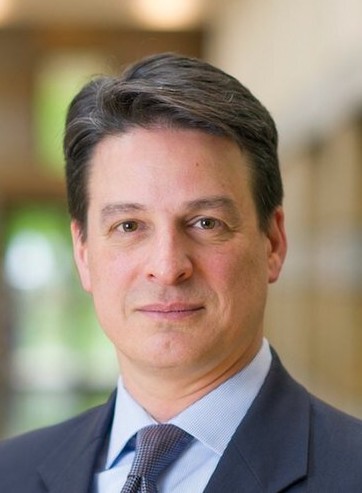
Paolo Carozza
Citation
Written by Fr. Michael Sweeney, OP, on January 2020 at the Induction in the College of Fellows
Paolo Carozza, husband and father, educator, author, diplomat, champion of integral human development, loyal son of the Church, the Dominican School of Philosophy and Theology salutes you.
In an address to participants in a seminar on the common good in the digital age, Pope Francis spoke of the challenge that you have undertaken in your work on behalf of justice, both nationally and internationally:
I realize how difficult it must be for you, who represent at the same time the globalization and specialization of knowledge, to define certain essential principles in a language that is acceptable and can be shared among all. Yet do not lose heart in seeking to attain such a goal…. Indeed, the key areas you are exploring will have an immediate and real impact on the lives of millions of people.
As a professor of law and political science and, recently, Director of the Kellogg Institute for International Studies at Notre Dame University, you have taught and written on constitutional law, human rights, democratic process, and the relations among nations, seeking always to ground such discussions in a concern for the dignity of the person. You have insisted that such “essential principles” as solidarity, subsidiarity and the common good can be practically applied in the realms of politics, jurisprudence and international law and that our understanding of the principles themselves matures through their application. So, for example, you have insisted that solidarity “ought to be recognized as a structural principle of international law and relations” while insisting that “…true solidarity requires gratuitousness, the lack of a political or economic interest apart from the recognition of our responsibility to others sharing in a common humanity.”
Always mindful of the dignity of persons, you have been attentive to the significance of human cultures and the manner in which the variety of human cultures is reflected in institutional differences. This sensitivity served you well when, from 2006 through 2010 you worked on the Inter-American Commission on human rights, and as president of the commission in 2008-2009. In recognition for your contribution to your work in the defense of human rights you were awarded the Order of Merit of Bernardo O’Higgins, Chile’s highest state honor awarded to foreign citizens.
You have responded generously to the call of your country and of your Church. You accepted the appointment by the Department of State to the Venice Commission to advise the Council of Europe on constitutional issues and you recently accepted an appointment to the Department of State’s new Commission on Unalienable Rights. You have been consulted by the Pontifical Council for Inter-religious Dialogue and, in 2016, you were appointed by Pope Francis to be Ordinarius of the Pontifical Academy of the Social Sciences.
As we attempt to receive and reflect upon the the divine revelation of which the Church is the custodian, we hope for our students that they will grasp the important and significant relationship between theory and praxis which you have wonderfully exemplified in your scholarship and in your diplomatic and academic commitments. We are truly grateful that you have consented to collaborate with us as a fellow of the school.
